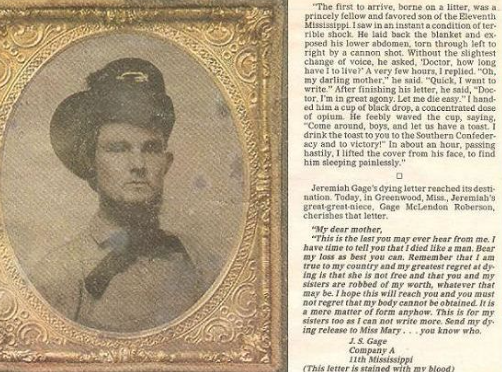HIS LAST LETTER
Posted By : manager
Posted : January 30, 2024
By Commander Charles Long
July of this year will mark the 160th anniversary of the Battle of Gettysburg. Many historians agree that this battle was the turning point in the war and that Pickett’s Charge on July 3, 1863, was the high water mark for the Confederacy. The following is of but one remarkable, yet tragic event, which occurred during this epic battle. Company A of the 11th Mississippi was on the left flank of Pickett’s desperate assault on Cemetery Ridge, on July 3, 1863. The Confederate unit called the University Greys, was formed on May 4th, 1861, and was comprised of nearly the entire student body and many of their professors, from the University of Mississippi. After two years of campaigning with Lee’s Army of Northern Virginia, the student soldiers were battle-hardened veterans. Under 1st Lt. Jonathan Moore, the attack of Brian’s Barn marked the furthest penetration into the Union entrenchments on the third day of fighting. The honor was dearly won, however, as the Greys suffered 100% casualties, with every man killed or wounded. Participating in the attack was 23-year-old 1st Sergeant Jeremi-ah Gage. Dr, Joseph Holt, Assistant Surgeon, 2nd Mississippi recorded the following as the dying and wounded started coming in from Pickett’s Charge: “The first to arrive borne on a litter, was a princely fellow and favored son of the 11th Mississippi. I saw in an instant a condition of terrible shock. I turned him and he pointed to his left arm. I quickly exposed it and found that a cannonball had nearly torn it away between the elbow and the shoulder. I made some encouraging remark and he smiled and said, ‘Why doctor, that is nothing, here is where I am hurt.’ He laid back the blanket and exposed his lower abdomen, torn from left to right by a cannon shot, largely carrying away the blad-der, much interest, and a third of the right half of the pelvis. Without the slightest change of voice, he asked, ‘Doctor how long have I to live?’ A very few hours I replied. I then asked, ‘Have you no message to leave?’ It startled him and in a low moaning wale he cried, ‘My Mother, Oh, my darling Mother. Quick, I want to write.’ By that time all who were crouching under the low shelter were crowded around, oblivious of their injuries and weeping silently. I lifted him and placed him reclining on my chest, and while supporting his arm, he wrote:
Gettysburg, Pennsylvania, July 3rd
My Dear Mother,
This is the last you will ever hear from me. I have time to tell you that I died like a man. Bear my loss as best you can. Remember that I am true to my Country and my greatest regret at dying is that She is not free and that you and my sisters are robbed of my worth, whatever that may be. I hope this will reach you and you must not regret that my body cannot be obtained. It is a mere matter of form anyhow. This is for my sisters too as I cannot write more. Send my dying release to Miss Mary … you know who.
J.S. Gage Company A 11th Mississippi
And then he wrote, “This letter is stained with my blood.” With that, he took the back of the letter placed it in his oozing bloody wound, and handed it to me. He then said, ‘Doctor, I am in great agony. Let me die easy, I would do the same for you.’ I promised him I would do so and handed him a cup of black drop, a concentrated dose of opium. He feebly waved the cup, saying, ‘Come around boys, and let us have a toast. I do not invite you to drink with me, but I drink the toast to you, to the Southern Confederacy, and victory!’
We laid him back on some improvised soft headrests and I rushed off to work amongst the wounded. In about an hour, passing hastily, I lifted the cover from his face, to find him sleeping painlessly.”
Jeremiah Gage’s dying letter did reach his mother. It is housed today at the University of Mississippi Library. Sgt. Jeremiah Gage even while dying set the supreme example of unselfishness and patriotism. Qualities that were so often displayed by the Confederate Soldier and Sailor. These qualities that we should all aspire to emulate.
